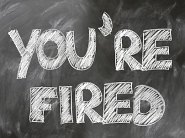Write a Resume After Getting Fired
 It isn't the end of your career; you can write a resume after getting fired to get back to work and regain your self-respect. Proper handling will minimize the damage caused by your dismissal.
It isn't the end of your career; you can write a resume after getting fired to get back to work and regain your self-respect. Proper handling will minimize the damage caused by your dismissal.
After Getting Fired Write a Resume
Being fired has varying degrees of severity. Were you dismissed because of a downsizing or job restructuring? Where you terminated because you did not perform very well? Alternatively, did you get fired because you did something dishonest or unethical? It matters why this has happened to you; the reason why it did will determine how you will need to address the situation.There are several common reasons why the employer would let someone go. The reasons are listed below, along with possible solutions to minimize the effects. If it wasn't your fault, because of downsizing, for example, then that is very different from something that was your fault. Also, be sure to know the difference between being fired and being laid off. Being laid off can happen to anyone and generally isn't due to the fault of the employee.
Career Help Center
How to Write a Resume After Getting Fired
Use the examples below to determine the reason that most closely resembles the cause of your dismissal.- You Got Fired
Being fired doesn't always have to mean you are an inadequate employee, although it usually does. There are some cases where a person is let go, but they didn't necessarily do anything wrong to warrant it. We are focusing on legitimate reasons for termination. We have several examples shown here so you know what some of those reasons are.- Too much time off
- Being late too often
- Distracting other employees
- Poor job performance
- Theft
- Lying on your resume
- Substance abuse at work
- Insubordination
- Breaking a company policy
- Personal business at work
- Conflicts with other employees
- You Got Laid Off
From the position of you gaining employment there shouldn't be any animosity toward you from an employer. At some point in their careers many people have been laid off.
If this occurred through no fault of your own, then you have no reason to be ashamed. Don't worry too much about not getting rehired, you will. Generally, the reason layoffs happen is because businesses don't have enough work, but there are many other reasons that this can occur including:- Downsizing
- Company relocation
- Mergers
- Business closure
- Temporary position
- Mitigation Strategies
The severity of your transgression determines the action to take using this strategy. The remediation will take place on the job application or at the job interview not on your resume. There are methods you can use to make your termination less noticeable. Here are some strategies you can use:- Use a functional resume format to focus more on your skills and education, and less on the timeframe of each job.
- Get references from other employees at your previous job to reduce the stigma of being a poor employee.
- If it was gross misconduct like stealing or insubordination then that is a more difficult situation to resolve. If you don't include the job and the company finds out about it they can let you go for being dishonest.
- Did you commit a less serious infraction like being late too often or taking too much time off? You could explain that you learned your lesson and you won't do it anymore.
- Did you work at the job for a long time? If you don't include it, there could be an employment gap which you would still need to explain.
- Are you thinking of not including the job because you didn't hold it for very long? If so when you list your education and employment histories on your resume you might use only the years for the dates without including the months. Depending upon your start and end dates, this tactic may help to cover up the gap.
***Please be warned that if you don't disclose the situation, the employer may terminate you when they discover the omission. Then you will have to deal with two firings. We are not recommending non-disclosure as an option. We merely put this alternative here as something you should not do, and to explain what the consequences would be in case you were considering it.
Be comforted with the thought that over time, you will come to terms with your termination and with a well-constructed resume; you can begin to move on with your career. After you finish your resume, you will need to prepare yourself to fill out job applications and to tackle interviews. To start to write your resume now, click the button here: